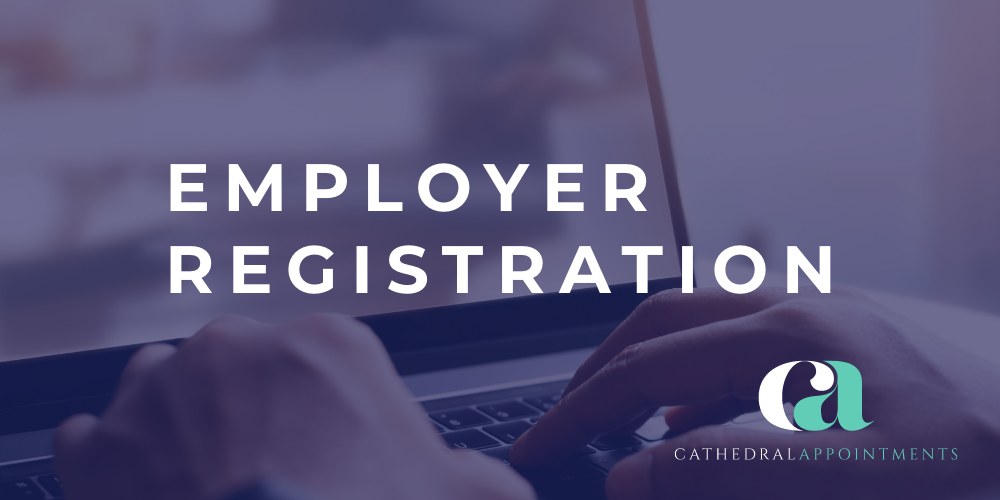Jo joined Cathedral Appointments over 25 years ago and now leads the business alongside Clodagh, who joined the company in 2021. Jo is a local employment expert and a former board member of Exeter’s leading business membership organisation, Exeter Chamber. She is also a Fellow of the Recruitment and Employment Confederation (REC) and has an Associated CIPD membership.
Blog
15 valuable interview tips for employers and small business owners
Posted in Employers
The www is crawling with tips designed to help hopeful candidates nail their job interviews. But come on. How about some assistance for the people sat on the other side of the table? Conducting an interview isn’t easy. You have just a few minutes of meaningful interaction to gather vital information on your candidates and make a judgement on their suitability for your vacancy.
Here are fifteen tips that will help you get the most from your interviews and ensure your candidates walk away with a tip-top impression of your business.
1. Take the time to prepare properly
Good interviews begin with good preparation. There are three things that require a little thought.
Firstly, you need a room for conducting your interviews. Make sure it’s somewhere quiet. Somewhere you can talk comfortably without losing focus. Somewhere private. You don’t want your interviewees feeling additional nerves because half of your workforce is within earshot.
Secondly, make sure interview slots are blocked out in your diary. The same applies for anyone joining you on the interview panel. Factor in time for debrief meetings to discuss candidate performance with your colleagues.
Finally, remember that your candidates are visiting your office for the first time. The route to the lift might be familiar to you, but nervous interviewees are going to feel darn disorientated. Make sure someone is available to greet candidates on arrival. And if your office building is a rabbit warren, email clear arrival instructions to your candidates a couple of days before the interview.
2. Research your candidates
You expect your candidates to research your business. The least you can do is research them. Make sure you are familiar with CVs and cover letters. It shows respect, reduces tension and encourages productive conversations that enable your candidates to elaborate on their skills. Added bonus: it makes it easier to verify that your interviewees are everything they claim to be on paper.
3. Don’t be too blinkered
Yes, it’s good to have a rough idea of the type of candidate you’re looking for before you begin the interview process. But don’t be too dogmatic. Stay flexible and look for skills that can benefit your business as a whole, rather than just the specific position you are hiring for. Allow yourself to be impressed by the leftfield applicant with that je ne sais quoi.
4. Be enthusiastic about the vacancy and your business
It’s not just prospective employees who need to give the best account of themselves at interview. Your candidate is searching for the right fit too. Be ready to make a glowing impression. Explain why working for your company is such a buzz. Get your candidate excited about the opportunity. For all you know, a string of local businesses could be eager to snap up the potential prodigy sat in front of you.
5. Offer drinks to your interviewees
Tea, coffee or just plain old H2O. Some candidates like to sip on a beverage to ease those pregnant pauses between conversations and bag themselves a few seconds of precious thinking time.
6. Explain how the interview will flow
A major contributor to pre-interview jitters is fear of the unknown. You can make your applicants feel more at ease by briefly explaining how the interview will be structured before you begin. Remember to leave time at the end for questions from the candidate. Every interview should follow the same basic format so you can easily compare candidates based on the same criteria.
7. Grilling is for the kitchen, not the interview room
Yes, it’s good to see how any potential employee can handle themselves in a high-pressure situation. But you’re not going to see a true reflection of your candidate’s abilities unless they’re able to relax - at least a little. The more your interviewees feel they can be themselves, the more you are likely to learn about them.
8. Ask the right questions
There’s a horrible trend for technology businesses to ask candidates baffling, brow-furrowing questions like: if you were a pizza driver, how would you benefit from scissors? Sigh. Doing the same might make you feel important, but is it really going to help you learn about your candidate? You only have a few minutes to gather crucial information on each applicant. Think about skills that relate to the job role and ask open-ended, sensible questions that encourage your candidates to push past pre-prepared answers. Look for genuine enthusiasm, clarity of communication and the ability to quantify achievements. Finally, double check that your questions are actually legal. There are some no-go zones.
9. Don’t forget to listen
Listening - really listening - isn’t easy. Especially when you are meeting someone for the first time. Unless someone is waffling relentlessly, let them finish what they are saying rather than jumping in with another question.
10. Get your body language in check
This is about more than getting your handshake right - though, let’s be honest, there are few things worse than a floppy handshake. Your body language helps to reinforce your words. Whether sitting or standing, keep your back straight with your shoulders relaxed and your chest out. Eye contact is important too. But don’t take it to the extreme. Hold eye contact for a few seconds at a time and vary your gaze around the applicant’s eyes, nose, mouth and so on. Self-touch makes you look nervous, so keep those paws under control.
Psst. Want to know what your candidates’ body language is revealing?
>> 15 body language tips to ace your interview
11. (Get someone else to) take notes
It’s hard to concentrate on a productive two-way conversation when you are frantically scribbling notes about your applicants on a piece of paper. That said, a few notes on each candidate can be invaluable when it comes to choosing between the various interviewees. The answer? Ask a colleague to join you in the interview to take notes. Their presence should be as non-invasive as possible.
12. Be prepared to answer questions
You’re unlikely to be the only one with questions to ask. Rope off time at the end of the interview for questions and expect to be asked about the business, the vacancy, the remaining recruitment process and opportunities for progression. Plan your answers beforehand if you are worried about getting caught unawares.
13. Respect your interviewees’ time
These days everyone is busy. Showing a little respect for your interviewees’ time can go a long way. Thank your candidates for their time and explain what the next steps are. Let them know when you will be informing them of the outcome of your interviews.
14. Remember the power of goodbye
Goodbyes are as important as hellos, so don’t switch off the moment the interview is over. Pay attention to the way your applicants exit the room. Do they seem satisfied with their interview performance or are they bolting for the door? Watch and learn.
15. Follow up as promptly as you can
One of the most infuriating things for jobseekers is employers that don’t follow up on interviews. Instead of leaving your candidates waiting anxiously - faith in humanity slipping a little more with each passing hour - do the decent thing and follow up as promptly as you can, even if they were unsuccessful. You may not be delivering the news they had been hoping to hear, but it shows business integrity and allows your candidates to move forward in their job searches. You want them to have a lasting good impression of your business even if they weren’t successful.
Over to you...
The interview process is a showcase for employer as well as applicant. Your aim should be not only to garner the information you need to make a confident decision on your candidates, but for them to leave your interviews feeling respected, valued and keen to join your business. Best of luck!

About cookies
We use cookies on this site to help improve user experience and deliver services. By using this site you consent to the use of cookies.

